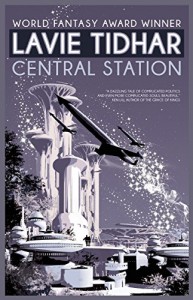

Central Station
by Lavie Tidhar
Central Station is one of the most breathtakingly, bewilderingly, mindbendingly imaginative stories I've read in some time. In terms of sheer breadth and volume of ideas, it reminds me of Hannu Rajaniemi, but Tidhar's style is far more lyrical and dreamlike. The story takes place in in a future Tel Aviv, now the site of Central Station. Adaptoplant neighborhoods blossom and twist around each other. Robotniks, the lost souls of forgotten wars, wander the streets and beg for spare parts. These soldiers, once resurrected to fight again and again as cyborgs, were shunted aside and now survive by selling the Crucifixation drug that once gave them a euphoric sense of faith in their cause. Babies created with gene-ripped Armani-knockoff blue eyes send a few prayers to St Cohen of the Others. Data vampires prey on the unwary, stripping them of exomemory. And surrounding it all is the ubiquitous Conversation, the universal talk of humans and robotniks and aliens and the almost omnipotent artificial intelligences of the Others, all connected through a web of virtual reality so dense that it permeates the real.
Central Station is a gorgeous book, but don't go into it expecting something that it's not. The story seemed to me to be primarily a vehicle for the ideas, and perhaps because of this, plot and characters are left undeveloped. Instead of driving narrative, the ensemble of characters and their "I-loop" narratives, riddled with unanswered questions, slowly reveal the world. The story is told with a dreamlike detachment that for me precluded engagement with the characters. In some ways, the book felt like a series of short stories set in the same world: the threads of the characters' narratives are often left unbound, and the people themselves are little changed by events.
(show spoiler)As one of the many themes of the story is the power of narrative, I think this was entirely intentional:
"Life was half-completed plots abandoned, heroes dying halfway along their quests, loves requited and un-, some fading inexplicably, some burning short and bright."
"There comes a time in a man’s life when he realises stories are lies. Things do not end neatly. The enforced narratives a human impinges on the chaotic mess that is life become empty labels, like the dried husks of corn such as are thrown down in the summer months from the adaptoplant dwellings, to litter the streets below."
The story is thematically rich, exploring the meaning of stories, of self, of consciousness, of reality:
“Consensus reality is like a cloth... It is made of many individual strands, each of which is a reality upon itself, a self-encoded world. We each have our own reality, a world made by our senses and our minds. The tapestry of consensus reality is therefore a group effort. It requires enough of us to agree on what reality is. To determine the shape of the tapestry, if you will.”
If you're looking for a unique speculative fiction story that rejects straightforward character-driven narrative, Central Station is definitely worth a look. It's almost hallucinogenic, a lyrical poem to a far future, with substance hidden in the shadows.
~~I received an advanced reader copy of this ebook through Netgalley from the publisher, Tachyon Publications, in exchange for my honest review. Quotes were taken from an advanced reader copy and while they may not reflect the final phrasing, I believe that they capture the spirit of the narrative as a whole.~~

 1
1




